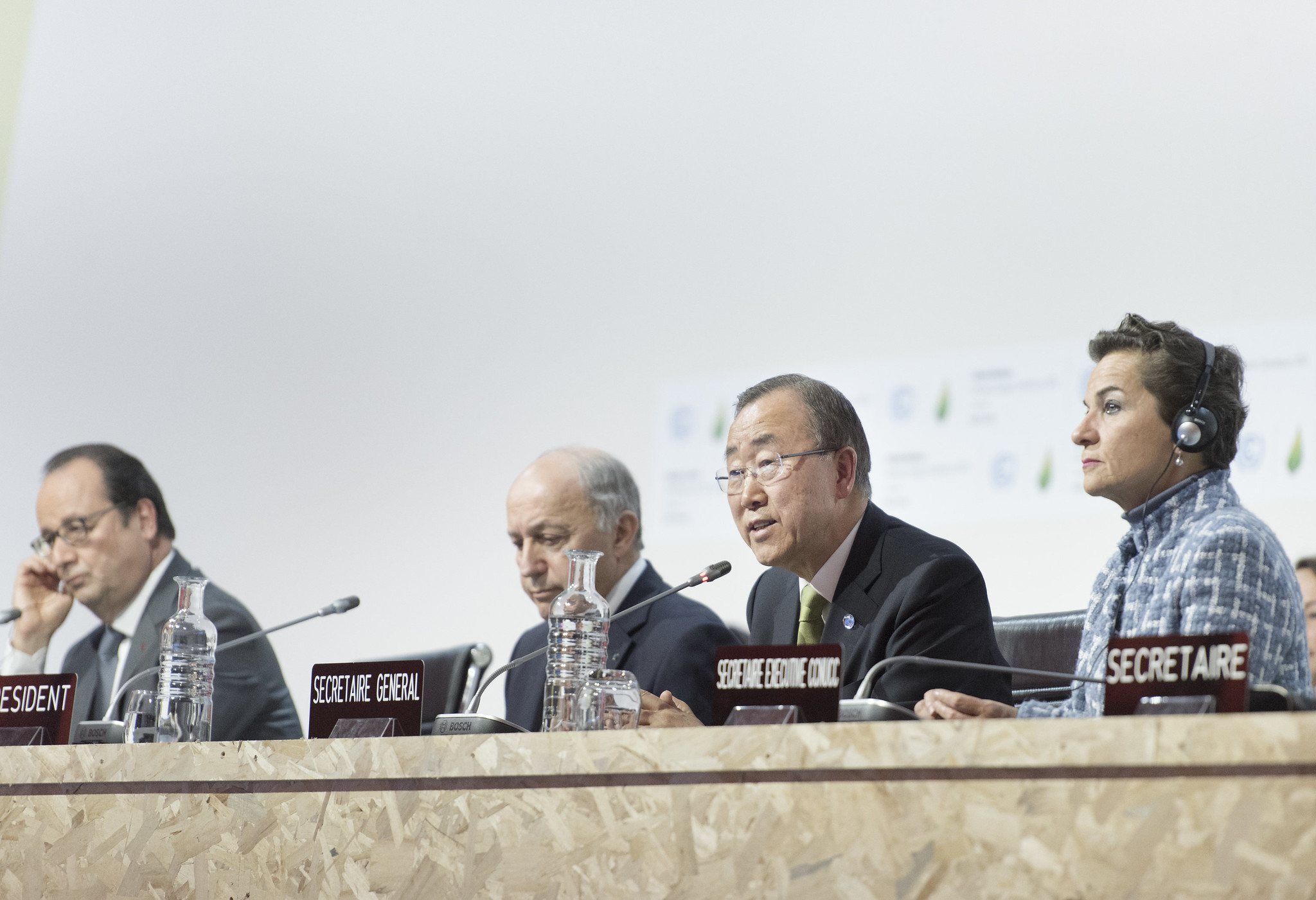Secretary-General Ban Ki-moonaddresses the Comité de Paris at the UN Climate Change Conference (COP21). Photo by the United Nations via Flikr.
United States Leaves Paris Agreement
For the second time in eight years, President Trump submitted the notification for the United States to leave the international accord that aims to reduce greenhouse gas emissions and adapt to climate change.
President Donald Trump took the oath of office for the second time on Jan. 20, only weeks after the planet closed out its hottest year on record. In fact, global surface temperatures have been breaking monthly records continuously since May 2023. Nevertheless, the new Trump administration took a series of actions which would not only impede the international effort to curtail global warming but would even accelerate it, including announcing the withdrawal of the United States from the Paris climate agreement on Day One.
The Paris agreement in 2015 was a landmark climate change agreement negotiated under an existing international treaty—the 1992 UN Framework Convention on Climate Change (UNFCCC). The United States is legally bound to the UNFCCC by a Senate-approved treaty, but the 2015 accord was treated as an “executive agreement” that did not require Senate approval. This is why Pres. Trump has the power to unilaterally withdraw the United States from the Paris agreement, as he did during his first term in 2017.
Over the past ten years of tedious international negotiations, the Paris agreement, for all its shortcomings, helped slow the trajectory of planetary warming. As the world’s largest historical greenhouse gas emitter, the United States has an outsized role in offering solutions. The Biden administration, for example, committed to a climate plan that aimed for a 61 to 66 percent reduction in carbon emissions by 2035, as compared to its emissions in 2005. The United States was the largest CO2 emitting country in 2005, meaning that reductions in CO2 from the United States will have an outsized effect on the percentage of global emissions reductions.
U.S. leadership in reducing greenhouse gases is jeopardized both because of the domestic policies implemented under the new administration and because of the abdication of its position on the world stage within the UNFCCC. Now, the United States will participate in the UNFCCC as a voting member that is sidelined from continued Paris agreement negotiations, which is where much of the progress is made. The United States will also have less leverage to hold other major economies accountable to their climate pledges.
The withdrawal from the Paris agreement and its obligations takes one year after notice is given, according to the agreement. This means that the United States will still be a party to the Paris agreement at the upcoming UN Climate Change Conference (COP 30) in Brazil in November, even if its team of delegates will be greatly reduced.
Yet while the United States withdrawal will have an impact, no one country can derail the global progress towards sustainable energy. The movement toward renewable and clean energy is a groundswell that transcends political happenstance.
The United States took on an international leadership role under Pres. Biden. That will end. There is a call for other nations to step forward, and Europe and China are taking the lead. Over half of the renewable energy generated last year was in China and the electric car and bus market in China is the largest in the world. China sent nearly 1,000 delegates to the UN Climate Change Conference last year where its Vice Premier said the country has provided or mobilized $24.5 billion in climate finance for developing countries since 2016, putting it at the same level as Great Britain. (China is the current largest greenhouse gas emitter; the United States is the largest historic emitter.)
Subnational actors in the United States are also taking on leadership. Local and state governments have announced their commitment to ambitious plans to reduce emissions. The U.S. Climate Alliance, for example, is a bipartisan coalition of 24 governors securing America’s net-zero future by advancing state-led, high-impact climate action. Together these states represent 54 percent of the country’s population and 57 percent of the country’s economy.
Seventeen cities, including Los Angeles, CA, Austin, TX, and Philadelphia, PA, as well as the states of Maine and California, have signed a “Fossil Fuel Non-Proliferation” treaty. The treaty, according to ww.fossilfueltreaty.org which runs the initiative, “would complement the Paris Agreement by providing the global roadmap needed to halt the expansion of fossil fuel, manage an equitable phase-out of coal, oil and gas, and lay the foundations for a true just energy transition in which no worker, community or country is left behind.” Ultimately it is the voice of grassroot support that will bear the most influence.
Faith in action
Write to your state legislators to ask that your state join the Fossil Fuel Non-Proliferation treaty https://mogc.info/FFNPT

